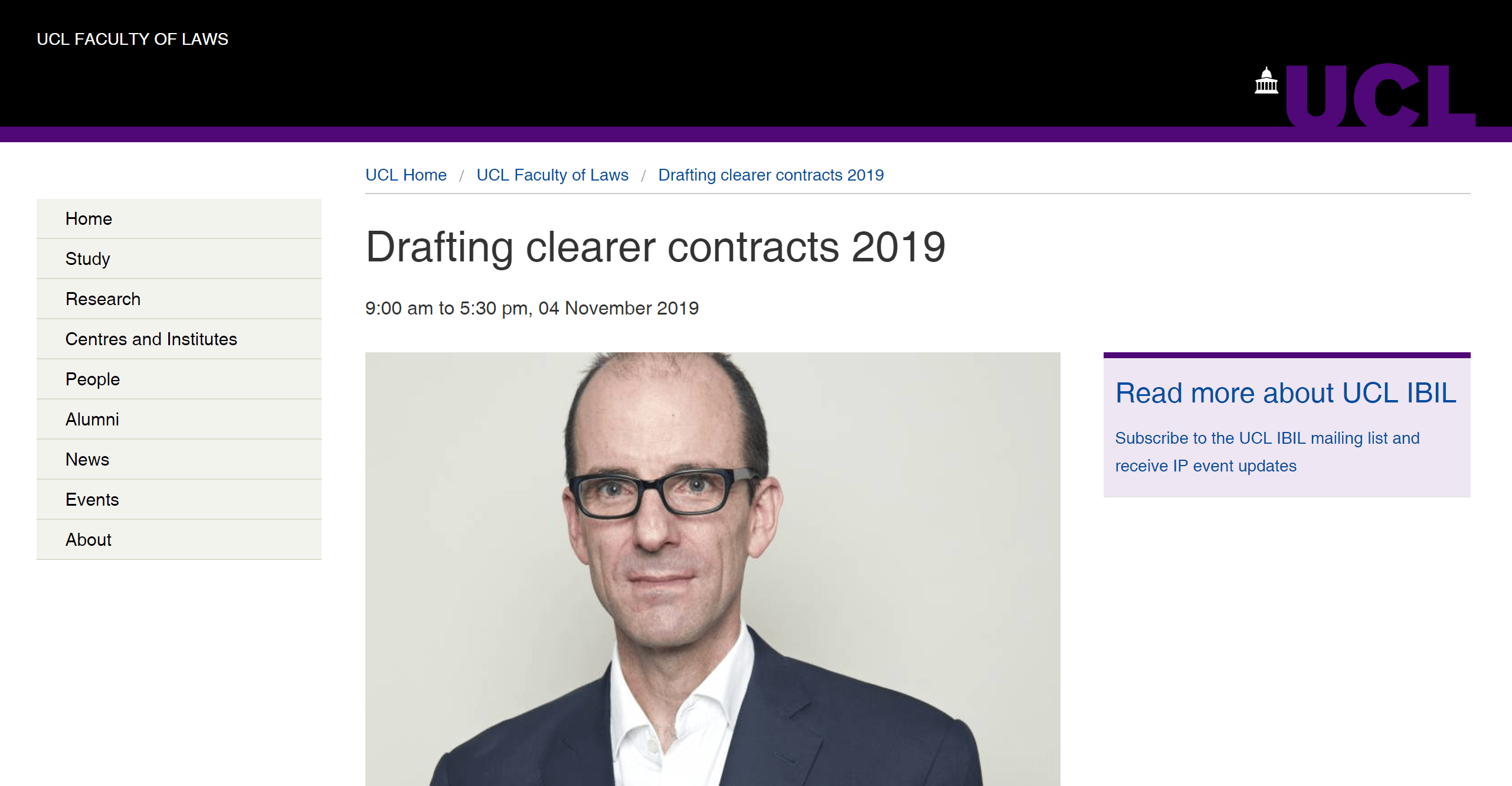 (This is an updated version of a post I did last year.)
(This is an updated version of a post I did last year.)
On 4 November I’ll be doing a day-long “Drafting Clearer Contracts” seminar in London for UCL Faculty of Laws. (For more information, go here.) I can think of eight reasons why you might want to attend:
- English contract drafting is dysfunctional. Generally, the prose of contracts leaves a lot to be desired, and no amount of Savile Row swagger can hide that that applies to English drafting. (Go here for my 2016 post dissecting a random example of “Magic Circle” drafting.) In the exchange on Twitter that I’ve embedded below, Mark Anderson memorably claimed that English drafting is better than U.S. drafting. But that sort of comparison is problematic and ultimately unhelpful. In a world of shit, not much is gained by arguing over whose shit is shittier. Instead, let’s make the task of cleaning up easier for those who are so inclined.
Meanwhile, US drafting… pic.twitter.com/H2QvHgfuoB
— Mark Anderson (@IPDraughts) May 31, 2019
- English contract drafting is really dysfunctional. Many who work with contracts have strange ideas about contracts prose. A disturbing feature of English contract drafting is that English courts too have strange ideas about contracts prose—they appear particularly prone to making stuff up. For a slam-dunk expose of that tendency, see my recent law-review article on endeavours provisions, here.
- MSCD is the only game in town. If you’re looking for a comprehensive and authoritative guide to the building blocks of contract language, you have a choice between my book A Manual of Style for Contract Drafting and … well, MSCD is actually your only choice. But it’s a safe choice. It was first published in 2004, so I’ve had four editions to get stuff right. It has sold tens of thousands of copies, with each new edition selling more than the previous edition, something that’s unheard of in legal publishing. Heck, in this review the Law Society Gazette describes the fourth edition as “extraordinary.”
- MSCD is geared to English needs. MSCD can safely be used wherever contracts are drafted in English. In particular, the fourth edition cites a fair amount of English caselaw and discusses usages particular to England. If Radiant Law is comfortable using MSCD (see this 2018 post), anyone else in England should feel comfortable using it too. But I expect that the legal establishment will take some time to warm up to me; go here for some thoughts on that from an English reader of MSCD.
- You can follow MSCD guidelines without drawing attention to yourself. Except in the case of two recommendations that I alert readers to, contracts prose that complies with MSCD flies under the radar. It simply does the job, without fanfare. A reader even reported with some disappointment that they hadn’t received plaudits for their MSCD-compliant drafting; I responded that that’s the way it should be (see this 2017 post).
- MSCD helps you stay out of trouble. Even if you’re not in a position to overhaul the prose of a particular contract, MSCD can still be of assistance: it can alert you to potential pitfalls and how to avoid them.
- I’m one of you. Sort of. Although I’m American, I spent my formative years in England, from age 11 to age 26. I went to Latymer Upper School, in Hammersmith, then I went to the University of York. After that I moved to the United States, but England has apparently left its mark: people occasionally note that I have a trace of an English accent. Someone even remarked on my English body language, whatever that means. And my brain is hard-wired with cultural flotsam and jetsam from one of England’s less glorious periods, the late 1970s.
- A good time will be had by all. By some miracle, people who attend my seminars find them interesting, even entertaining. Check out the testimonials on UCL’s web page for the seminar.
I hope to see some of you there!
